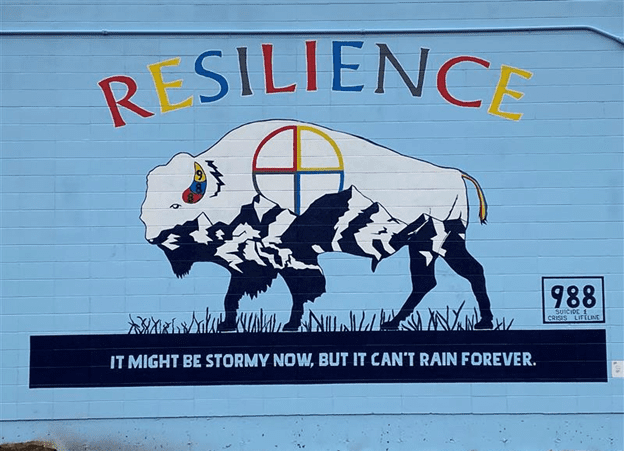Community
Home »
Building a Stronger Future Through Connection and Support
Through outreach, advocacy, and community-based programs, we help ensure our people have access to the resources and support needed to build strong, healthy foundations and stay connected to community.
Central to this work is the Eagle Seeker Community Center—a welcoming space for healing, cultural exchange, and connection. It’s where tradition and community come together to support holistic well-being.
Whether through direct services, case management, or community-led initiatives, NADC remains deeply committed to strengthening our communities—today and for generations to come.

Outreach & Community Programs
NADC’s outreach initiatives are designed to support the well-being of Native individuals and families through specialized programs and direct intervention services. Our programs focus on mental health, substance abuse prevention, and youth support, ensuring that community members have access to critical resources.
These programs are designed to promote healing, strength, and resilience, fostering a healthier and more connected community.
Services include:
- Case management
- Credit Repair
- Housing Information
- Employment Assistance
- Job Training
- Mental Health
- Substance Use Treatment
Montana Tobacco Use Prevention Program
Provides education on traditional tobacco practices while supporting individuals in quitting commercial tobacco.
Location:
Billings First Congregational Church
(310 N. 27th St. Billings, MT)
Daily Transportation from Church to BUIHWC
10:00am | Monday – Friday
Youth Programming at BUIHWC
Through Youth & Family Nights, we bring together young people and their families for fun, cultural activities, and shared meals. These events help build strong relationships and a sense of belonging.
Our Urban Warriors Youth Advisory Council gives Native youth a voice in shaping the programs that matter to them, fostering leadership and empowerment.
With staff at Medicine Crow Middle School, we support students by providing cultural connection and guidance right where they are.
By focusing on culture, connection, and support, BUIHWC helps Native youth grow strong, confident, and connected to their community.


Community, Culture & Connection
It’s where families gather for celebrations, youth play sports, elders are honored, and meals are shared. It’s a place for ceremony, joy, conversation, and connection—where culture lives and community comes together.
Whether it’s a birthday, a basketball game, a community feed, or a cultural gathering, the Eagle Seeker Community Center is here to support the everyday needs of our people while holding space for the traditions that carry us forward.
NADC remains committed to providing a space where Native identity is celebrated, community is strengthened, and everyone feels a sense of belonging.
Visit eagleseeker.com to learn more.
Important Information About
Urban Indian Organizations (UIOs) Funding
To sustain operations, UIOs rely on state or local funding, private foundations, and philanthropic support. While they receive some IHS contracts or grants, these funds make up only a small fraction of the total IHS budget. Medicaid and Medicare reimbursements serve as a major revenue source, along with private insurance payments from covered patients.
While agencies like the CDC and SAMHSA offer funding opportunities, HRSA funding is generally restricted. Most UIOs are Federally Qualified Health Center (FQHC) Look-Alikes, meaning they meet FQHC requirements but do not receive direct HRSA funding. To qualify for HRSA grants, UIOs must be Section 330 eligible and designated as a New Access Point (NAP) site or full FQHC, which most are not.
UIOs also do not qualify for 100% FMAP for Medicaid services provided to Al/AN patients. Unlike IHS and tribally operated facilities, where the federal government covers the full Medicaid cost, states must share in the cost of Medicaid reimbursements for UIOs. They also do not qualify for the All-Inclusive Rate for Medicaid and Medicare reimbursements.

How to Get Involved
Organizations and individuals can also book spaces at the Eagle Seeker Community Center for gatherings, cultural events, and community initiatives. By getting involved, you contribute to the growth and success of programs that uplift Native communities.
To learn more about upcoming events, partnership opportunities, and ways to support our mission, contact us. Together, we can create a thriving future for Native communities.